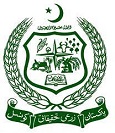Aflatoxin Biocontrol Training

“Aflatoxin Biocontrol Training” Dr. Zakir Hussain Dahri, DG, PARC-SARC said that main objective of the technical collaboration b/w PARC-SARC, PARC-NARC and CABI Regional Bioscience Centre Pakistan with the financial support of USAID/USDA was to spread awareness and help out chilli farmers of Sindh province to increase their capacity regarding aflatoxin, international standards and their regulations respectively. He paid vote of thanks to the management of Jinnah University for Women (JUW) for coordination and permission to organize the 4th Training Workshop “Aflatoxin Biocontrol Training” under “Regulatory Harmonization in Pakistan for MRLs and Biopesticides” attended by faculty members and research students of JUW, Karachi and Mohammad Ali Jinnah University (MAJU), Karachi held in JUW, Karachi on 06th October 2022. He stressed upon to strengthen the active collaboration b/w research institutes, academia and industry for the welfare of farming community. Mr. Parwaiz Ahmed Baloch, Director FQSRI welcomed all participants, thanked management of both universities and wished that efforts of FQSRI, PARC-SARC team would help the participants to increase and improve their knowledge and skills respectively. He thanked Dr. Farzana Ibrahim for her cooperation to conduct the training workshop. Dr. Najmus Sahar, SSO, FQSRI, PARC-SARC, Karachi depicted the national status of aflatoxin contamination in chilies and its critical control points through which it could be minimized. It was informed that pre and post harvest practices i.e. Good Agricultural Practices (GAP) including Good Drying, Storage and processing practices were essential to carry out along with biocontrol technology to minimize the hazardous impact of poisonous fungal infestation and aflatoxin contamination in chili crop. Dr. Hamzah Shahbaz, Programme Officer, CABI highlighted the importance of chilli crop as Pakistan was 4th larger producer of red chillies earning 6.9 million US dollars. He accentuated the problem associated with the chili crop production and its decline export in Pakistan. He informed the participants that Aflatoxin was a serious threat to food security by infecting many of Pakistan’s agricultural products, including cereal grains, chilies, dry fruits/nuts and milk. To address this problem, all collaborators worked together and developed first biocontrol product of Pakistan “AflaPak” to mitigate this issue from field to fork. Dr. Atif Jamal PSO, CDRI, NARC, Islamabad emphasized the occurrence and hazardous effects of aflatoxin on human and animal health. He demonstrated the difference between toxigenic and atoxigenic strains of Aspergillus flavus. He delivered his presentation on the importance of biocontrol technique to control the aflatoxin in maize, chili, dry fruits etc. at farm & field level. The CDRI, NARC were the first to develop Aflatoxin biocontrol laboratory with the technical and financial support of CABI/USAD/USAID. Prof. Dr. Narmeen Zakeria Bawany, Dean Faculty of Science, JUW, thanked session organizers, speakers of the session, management of PARC-SARC, NARC and CABI with the support of USAID/USDA to organize a successful training workshop along with the collaboration of JUW and MAJU, all chairpersons, senior faculty members and research students of both universities. Prof. Dr Kamran Azeem Dean, Faculty of Life Sciences, MAJU, Karachi, attended the event as Chief Guest, concluded the session by his valuable remarks on crop protection through Biocontrol. He appreciated the efforts of organizers and urged the participants to get maximum benefits from knowledge conveyed by the resource persons. Mr. Wajeehuddin Ahmed, Chancellor, JUW, Karachi presented shields to Director General (PARC-SARC), Director (FQSRI) and Dr. Atif Jamal, PSO (CDRI, NARC) however, certificates were distributed among all participants. Reported by: Parwaiz Ahmed Baloch Director, FQSRI, PARC-SARC and Dr. Najmus Sahar, SSO FQSRI, PARC-SARC
